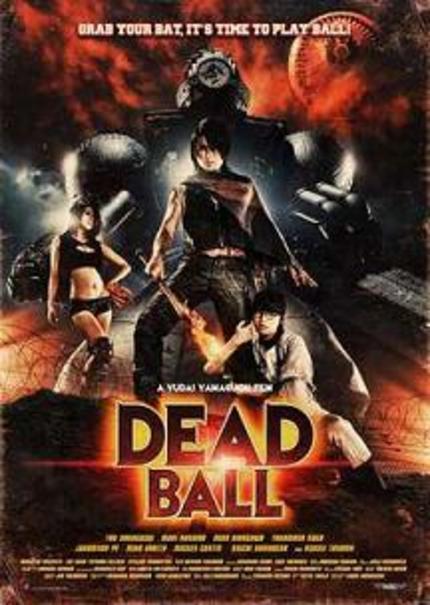ETRANGE 2011: DEAD BALL review

The prologue swiftly sets up the air of gonzoid bravado, with the young Jubei Yakyu (Sakaguchi Tak) accidentally killing his father in a friendly game of baseball when he unleashes the destructive capabilities of his super-powered pitching. Wracked with guilt over having traumatised his little brother in the process, Jubei turns into a savage juvenile delinquent, eventually banged up in a maximum-security institution for irredeemable offenders. But the governor offers him a lifeline, sending him undercover to infiltrate the crazed sporting league run by the warden to root out Jubei's brother, who's supposedly involved in this somehow - only neither side are being entirely straight with him.
None of this makes any sense, cheerfully riffing on clichés of every stripe, from stock manga archetypes, to 60s and 70s action cinema, to goofy swipes at overseas pop culture and movie tropes in general. The acting's about as broad as it gets, and the jokes occasionally skirt being actively offensive rather than merely tasteless. Practically every scene was clearly shot in some kind of abandoned building or empty stretch of wasteland, the picture quality barely holds up, and while the effects - which we'll get to in more detail - are surprisingly detailed they're not remotely realistic. It's somewhat disappointing given Nishimura's pedigree to see what looks like the odd spray of CG, too: either that or some extraordinarily ugly long shots which give the same impression.
But in one sense none of this matters in the slightest. From the moment Jubei's dying father wistfully breathes 'Man... that was a hell of a pitch, son' you can feel the giggles rising up your craw no matter what, and it only gets better. The overall effect is certainly of a bunch of grown men enthusiastically pushing your buttons to make you grimace in revulsion, but scenes like the rectal exam administered by the prison (replete with gurgling, spurting noises in the background) or what they serve up at mealtimes are just so gleefully dumb it's almost impossible not to laugh. Little if anything of this makes any sense, either, with some characters walking around with battle scars for most of their screen time and others back to normal the very next scene, but it just adds to the general eagerness to please.
And while Dead Ball doesn't afford Nishimura quite the same opportunities for full-on insanity as some of his CV, the veteran FX man (knowing he's been entrusted with most of the budget) still manages to come up with some memorable pieces of work. Not just pure grindhouse, either - a brief scuffle pitting Jubei against the warden throws in a couple of wildly funny Looney Tunes-esque moments. Again, these are all blatantly transparent, but each still comes across much like re-watching the original The Thing; it's all too obvious none of it's real, but the thought, effort and genuine pleasure that clearly went into lodging a baseball in a guy's eye socket, turning people into pink mist or tearing someone's face off is still a guilty pleasure despite how plastic it might seem.
It's hard to decide when a film like Dead Ball goes too far, but there are moments Yamaguchi and co-writer Keita Tokaji's script gets a tad uncomfortable. The revelation the warden's a Nazi sympathiser is actually fairly mild - it's so daft it's difficult to feel offended - but the lunchroom gag pushes gross-out humour a little further than it really needed to go, some of the violence struggles to be more than purely distasteful (a robot with a giant, spiked baseball bat slaughtering screaming, scantily-clad women) and the lazy gay panic jokes could have been stripped out, too. Some of the set pieces are just too cheap and cheerful to really work; seeing Jubei fight the warden's aide simply isn't that interesting and it's obvious Yamaguchi couldn't afford much of a choreographer, if any.
But much of this won't matter to the intended audience, and it's not too hard to overlook. Dead Ball still has the general air of a close-knit gang of talented individuals doing their level best to have fun with virtually no money, and their enthusiasm proves greatly entertaining. It's difficult to recommend to anyone who's not already into Japanese pop culture and the way its practitioners like to see the human body go squish, and the production values are so threadbare a lot of people could end up turned off by that alone. This isn't really a good film: it's a quick and dirty setup for some shameless crowd-pleasing aimed at a pretty niche market. Nonetheless, if that's what you want, Dead Ball is put together with such an unremitting party atmosphere and love for the material it's hard not to recommend it regardless.
(Dead Ball was screened as part of the 17th L'Etrange Festival at the Forum des Images in Paris, run from 2nd-11th September 2011.)

Do you feel this content is inappropriate or infringes upon your rights? Click here to report it, or see our DMCA policy.






